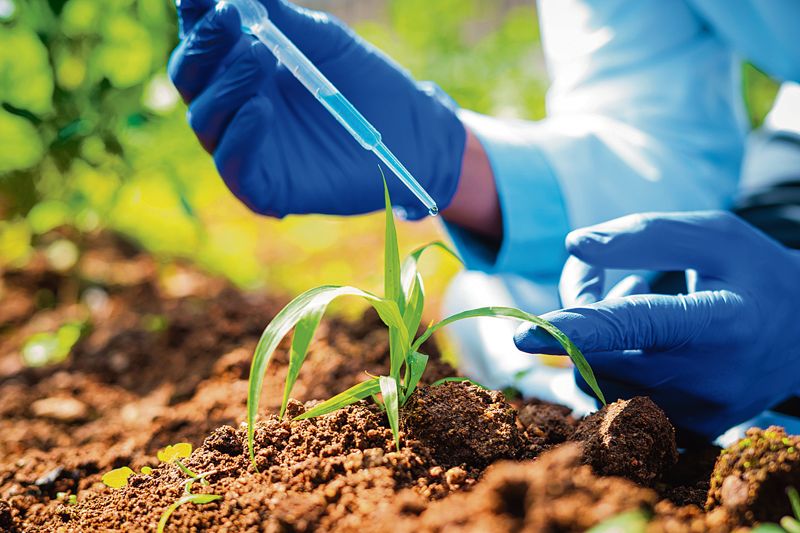PhD program in ICT for Sustainable Agriculture
PhD program ICT in Agriculture
 The project will model, create, and deploy an interdisciplinary and inter-university Ph.D. program and a living lab to model sustainable connected farming digitally.
The project will model, create, and deploy an interdisciplinary and inter-university Ph.D. program and a living lab to model sustainable connected farming digitally.
The Ph.D. program will be deployed in Europe (one cluster) and in three experimental clusters in participating countries (Algeria, Thailand, and Uzbekistan). Fundamentally, the project will educate a pool of Ph.D. students, researchers, and farmers about sustainable, connected farms (Eco-Friendly Farming). Specific training material and underlying pedagogical patterns will be developed and available to educators from IT departments, agriculture schools, etc.
Each experimental site is part of a local ecosystem that includes, besides the farm, startups, and a university research group with people from Information and Communication Technology (ICT), Environmental science, and Farming/Agriculture.
The four clusters will be connected via the cloud/Internet of Things to form a living lab for education and innovation. The students from existing PhDs and professors will contribute to developing the clusters of the underlying living lab while getting training in ICT, sustainability development, and agriculture sciences. The living lab and the various are built on top of the Open AI codex, several training tracks, and materials to understand the main sub-systems of sustainable farming, mainly how digitalization can help to move from traditional farming to digitally assisted sustainable agriculture.
The project suggests that agriculture is undergoing a fourth revolution triggered by the exponentially increasing use of ICT in agriculture. Critical technologies for creating digital agriculture include IoT/Digital Twin, AI, and Data Science, as well as citizen science to get citizens, farmers, and all stakeholders engaged in sustainable farming.
 Digital agriculture has the potential to contribute to more economically, environmentally, and socially sustainable agriculture while meeting the agricultural goals of a country more effectively. Both information and communication technologies (ICTs) and agriculture are essential for achieving the Sustainable Development Goals (SDGs). And yet, even though most stakeholders have long recognized the need for strategies for national e-agriculture, also known as digital agriculture, most of the countries covered by this report have not implemented a national strategy for the agricultural sector’s use of ICTs.
Digital agriculture has the potential to contribute to more economically, environmentally, and socially sustainable agriculture while meeting the agricultural goals of a country more effectively. Both information and communication technologies (ICTs) and agriculture are essential for achieving the Sustainable Development Goals (SDGs). And yet, even though most stakeholders have long recognized the need for strategies for national e-agriculture, also known as digital agriculture, most of the countries covered by this report have not implemented a national strategy for the agricultural sector’s use of ICTs.
Furthermore, education through research and open innovation is needed to address the digital transformation of agriculture sustainably. In response to the call of the 2020 Global Forum for Food and Agriculture (GFFA), it has been proposed that FAO host an International Platform for Digital Food and Agriculture that will
- Promote the coordination and strength of the linkages between international forums for agriculture and those for the digital economy to enhance the awareness of the international community to issues specific to the digitalization of the food and agriculture sectors
- Support governments with policy recommendations, best practices, and voluntary guidelines that can enhance the benefits of digital technology applications on agriculture, while addressing potential economic, social, and ethical impacts and concerns.
Fundamentally, the project will educate Ph.D. students, researchers, and farmers about sustainable, connected farms (Eco-Friendly Farming). Specific training material and underlying pedagogical patterns will be developed and available to educators from IT departments, agriculture schools, etc.
Each experimental site is part of a local ecosystem that includes, besides the farm, startups, and a university research group with people from ICT, environmental science, and farming/agriculture.
Benefits
-
- Research Collaboration: The consortium could facilitate collaborative research efforts among agricultural research institutions, universities, and industry partners. It could bring together experts from various disciplines to work on innovative solutions for agricultural challenges.
- Knowledge Sharing: The consortium could establish a platform or network to facilitate sharing research findings, best practices, and technological advancements in agriculture. This could include organizing conferences, workshops, and webinars and maintaining an online repository of research papers and resources.
- Technology Assessment: The consortium could evaluate emerging agricultural technologies, such as precision farming, remote sensing, artificial intelligence, and blockchain, to assess their potential impact and suitability for different farming systems. This could involve conducting pilot projects and field trials to gather data and provide evidence-based recommendations.
- Policy Advocacy: The consortium could engage in policy discussions and advocacy related to agriculture innovation. It could collaborate with government agencies, policymakers, and regulatory bodies to promote supportive policies, regulations, and funding mechanisms for research and development in the agricultural sector.
- Capacity Building: The consortium could focus on building the capacity of researchers, farmers, and agricultural professionals by providing training programs, workshops, and mentorship opportunities. This could include topics like sustainable farming practices, climate resilience, and the adoption of innovative technologies.
- International Collaboration: The consortium could establish collaborations with similar organizations and research institutions globally. This could involve sharing resources and expertise and fostering international research partnerships to address global agricultural challenges and exchange knowledge across borders.
- Funding and Grant Opportunities: The consortium could actively seek funding from public and private sources to support research projects and innovation in agriculture. It could also provide information and assistance in accessing grant opportunities for agricultural researchers and entrepreneurs.
- Stakeholder Engagement: The consortium could engage with various stakeholders, including farmers, industry representatives, non-governmental organizations, and consumer groups, to understand their needs, gather feedback, and ensure that research efforts align with the practical requirements of the agricultural sector.
More specifically, the following are the capacity building for EU participants and the other countries.
-
- Programs and profiles: Help the partner countries to develop and improve their Ph.D. education and research while establishing Ph.D. program profiles in the three core knowledge areas (Agriculture, ICT, and Sustainability). This project is built to support partners in sharing their expertise in courses and labs while helping each one improve its weaknesses in areas that some other partners have.
- Student training: Train the next generation of highly qualified academic researchers and educators in different research areas of software engineering. The wide range of Ph.D. students involved in the project will acquire a deep understanding of research methods and be skilled in writing, presenting, and interacting with the international research community via projects and conferences. By visiting labs and taking courses at different locations, Ph.D. students will have a unique opportunity to discover a broader range of research niches in software engineering than they see in their university. The students will be able to network and participate in different ongoing research projects at the different partners’ locations.
- Academic research and professors: Allow all participating professors and their research groups and centers to know each other and to collaborate on joint research projects, courses, and strategic partnerships, including joint research infrastructure, publication, and Ph.D. supervision. Professors accompanying or providing teaching in the different locations will be able to be in touch with potential Ph.D. candidates and contribute to developing co-supervision with local colleagues.
- Target countries and institutions: Support target countries in developing their capacity in software engineering education at the Ph.D. level and fundamental research. This project will help non-Eu countries build their own Ph.D. programs in ICI and Agriculture Sciences while discussing possibilities for joint doctoral programs with EU partners.
- Participating universities and countries: Help European partner universities develop their capacity to collaborate sustainably with partners with different research traditions and cultural backgrounds in international and multi-disciplinary environments. The project is a way to deliver education that can supplement the country/university educational system. Beyond dual Ph.D. programs, the project opens the door for the development of joint research ventures, a typical campus, and distributed research centers.
